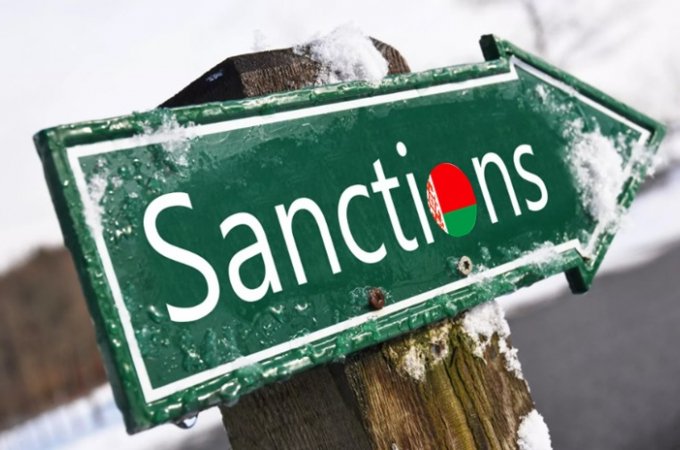The West Imposes New Sanctions and Strengthens the Blockade of Belarus
 The situation has not changed
The situation has not changed

A fresh round of sanctions against Russia and Belarus has been introduced by the West, coinciding with the second anniversary of the onset of Russian aggression against Ukraine. Until now, Western countries and their allies had refrained from implementing synchronized sanctions against Minsk and Moscow. However, this hasn’t deterred the Baltic countries from persisting in tightening the “iron curtain” around Belarus – both for citizens and goods.
On the eve of the second anniversary of Russia’s aggression against Ukraine, the 13th package of EU sanctions against Russia and Belarus came into effect. This package included Belarusian individuals and organizations:
- OJSC “Peleng”
- 2566th radio-electronic weapons repair plant and its director Valery Shatilo
- Orsha Aircraft Repair Plant and its General Director Pavel Sluchak
- Secretary General of the Belarusian Red Cross Society Dmitry Shevtsov
- Alexey Talai and his charitable foundation
- Dmitry Demidov, Chairman of the Novopolotsk District Executive Committee
- Non-governmental organization “Dolphins” and its founder Olga Volkova
- Citizen of Belarus Sergei Astafurov, director of the Russian company “NTC PROMTEHAERO”
- Native of Belarus Vasily Shupranov, general director of the Nizhny Novgorod Machine-Building Plant.
The US Treasury Department has imposed new sanctions against almost 300 individuals and companies from Russia and Belarus. These sanctions are timed to coincide with the second anniversary of Russia’s attack on Ukraine, as well as the death of Alexei Navalny in a Russian colony. The sanctions included Russian banks, the Mir payment system, financial companies, Russian defense enterprises, individuals, and companies outside Russia that assist in transferring technology and equipment for the Russian military-industrial complex. On the Belarusian side, the sanctions list includes the 558th Aviation Repair Plant in Baranovichi and its director Pavel Pinigin, as well as Paralympic athlete Alexey Talai. Sanctions were also imposed against the Russian Ambassador to Belarus Boris Gryzlov and Dmitry Mezentsev, the former Russian Ambassador to Belarus and Secretary of State of the Union State.
In response, the Lithuanian government decided to close the Lavoriškės and Raigardas checkpoints from March 1. On the Belarusian side, there are points “Katlouka” and “Pryvalka”. Checkpoints are closed to vehicles, pedestrians, and cyclists. The movement of pedestrians and cyclists will also be limited at the Medininkai and Shalchininkai checkpoints. Additionally, the Lithuanian government agreed to gradually reduce the number of permits for the transportation of passengers by buses – for both Belarusian and Lithuanian carriers, and to limit the boarding and disembarking of passengers at the Kena station.
Vilnius justifies this step by stating that due to closed checkpoints in neighboring countries, the flow of goods, transport, and people across the Lithuanian-Belarusian border has increased. Lithuanian services require large resources to control the border and prevent smuggling and evasion of sanctions. Lithuania also refers to the risks associated with the increased activity of the Belarusian intelligence services. In the context of discussions about a possible invasion of Belarus and Russia in the direction of the “Suwalki Corridor,” Lithuanian authorities fear that the Belarusian and Russian diaspora may even be involved in a hybrid attack as a “fifth column.”
This explains the information campaign for dehumanization (comparing Belarusians with biomass) – a clear indication of the preparation of Lithuanian public opinion for more stringent restrictions. All these restrictions are introduced within the framework of the proposals of the National Security Commission and are aimed at forming an “iron curtain” around Belarus.
The proposal of the Lithuanian Ministry of Foreign Affairs to the government of the country to terminate the existing agreements on trade and economic cooperation signed with Russia and Belarus two decades ago fits into the same logic. According to the Lithuanian Foreign Ministry, the agreements should be denounced due to the ongoing military aggression of Russia and Belarus against Ukraine and the fact that cooperation with them has been completely suspended and is impossible.
Recently, the Latvian Seimas adopted amendments to the Law on Agriculture and Rural Development, which prohibit the import of agricultural and feed products from Russia and Belarus for consumption in Latvia. According to the amendments, the import of these products from third countries will also be prohibited if they originate from Russia or Belarus. The import ban will apply to agricultural and livestock products that remain in Latvia and will not affect those transported to other EU countries.
Next, the Ministry of Agriculture of Latvia submitted for approval draft rules that define specific agricultural and feed products. The import of peas, wheat, wheat-rye mixture, rye, barley, oats, corn, rice, grain sorghum, buckwheat, millet, millet, and other grain products of Russian and Belarusian origin will be prohibited in Latvia.
Subscribe to our newsletter




Situation in Belarus
Constitutional referendum: main consequences


 Video
Video
How to count the political prisoners: are the new criteria needed?


 Video
Video
Paternalism In Decline, Belarusian Euroscepticism, And The Influence Of Russia


 Video
Video












